Monday, June 27, 2005
The Spanish Dances of Enrique Granados
Now, Alicia de Larrocha has made me fall in love with Granados's music again. I started on the Danzas Espanolas and I just couldn't stop listening, all the way up to the last of the twelve tracks. Her Danza Espanola No. 2 (Oriental) was just so tender and charming that it made my heart ache like never before. And she drew out the full melancholy yet melodious beauty of Danza Espanola No. 4 (Villanesca) so perfectly well. There's just so much to praise for her each and every track. Have I ever heard of a guitar who can play such pieces as well as she did? Well, Mr Manuel Barrueco was close, but nowhere at the level of this queen of the Spanish piano. Now, these twelve dances will be in my list of desired repertoire in the near future. How I wish I could caress such exquisite and soulful music out of the guitar like how Miss de Larrocha did on her piano...
Sunday, June 26, 2005
Balancing Dissonance With Consonance
Just read a book on the healing abilities of music and it evokes some thoughts in my mind. Over the years, dissonances have been used in music, to evoke tension and despair. Just by changing one note in a major chord, we get a sound which would break our hearts. In most traditional music, dissonances will be resolved somewhere in the piece, by returning to normality. Composers are probably holding the mentality that life is too short to be continue lamenting with pessimism. Such music infuses hope and faith in the listeners, are uplifting and regenerative. Now, for the other side of the picture...
Recently, atonalism came into the scene. What is going on in the modern composers' minds? It seems that music full of dissonances sprang up in the period between the world wars. For most people, atonal music causes them to cringe in disgust instead of feeling anything which you would call emotion and leaving them cold. Why such a reaction from the people? What exactly is in that sort of music? Maybe what the composers are trying to do in their music is to put in as many emotions as possible into one chord. With so many emotions in one chord and the natural human inertia to overwhelming changes, it's probably why listeners will just form this emotional barrier to such music and block out all the overpowering emotions. Are the composers being disillusioned by the problems they see present in the world, that they just decide not to have a key signature to return to after the rollercoaster rides for they see no chance of the problems in the world being resolved, or are they just sick of the peaceful music that they just decide to pull out of tonality and venture into the unknown? Maybe to appreciate such new music, one needs to have a very open mindset and accept all the emotions that's being directed at them by the musician. But I certainly hope that such music can be kept to a minimum in the concert hall, but not eradicate them completely, for I have no wish to see that the concert hall become a place of terror and dread for the arts lovers.
Recently, atonalism came into the scene. What is going on in the modern composers' minds? It seems that music full of dissonances sprang up in the period between the world wars. For most people, atonal music causes them to cringe in disgust instead of feeling anything which you would call emotion and leaving them cold. Why such a reaction from the people? What exactly is in that sort of music? Maybe what the composers are trying to do in their music is to put in as many emotions as possible into one chord. With so many emotions in one chord and the natural human inertia to overwhelming changes, it's probably why listeners will just form this emotional barrier to such music and block out all the overpowering emotions. Are the composers being disillusioned by the problems they see present in the world, that they just decide not to have a key signature to return to after the rollercoaster rides for they see no chance of the problems in the world being resolved, or are they just sick of the peaceful music that they just decide to pull out of tonality and venture into the unknown? Maybe to appreciate such new music, one needs to have a very open mindset and accept all the emotions that's being directed at them by the musician. But I certainly hope that such music can be kept to a minimum in the concert hall, but not eradicate them completely, for I have no wish to see that the concert hall become a place of terror and dread for the arts lovers.
Swan Lake Ballet
Caught it again today. Sat right at the front, and it was yet another totally ethereal feeling. It was like every small detail on stage was displayed clearly in front of me. And yes, together with the beauty, I could see how much effort is needed by dancers to form this wonderful ballet. The legendary choreography by Lev Ivanov and Marius Petipa probably stretched limits of the human body to the maximum to accomodate such quality ballet music by Tchaikovsky.
And yes, tonight's ballerina was Roberta Marquez again. She danced two performances of Swan Lake in two consecutive nights? Oh well, she ought to get a long break from the troupe for performing such a unbelievable feat. But since I was sitting in the front today, she did seem a little tired today, though that didn't stop her from giving the audience a wonderful performance. She earns my utmost respect for that. And I have seriously no idea what happened to Alina Cojocaru, the ballerina I expected to see. Guess she probably needed a break from ballet for this period and left the entire whole performance last night to Marquez...
And yes, I forgot to mention in the last entry that the corps de ballet of the Royal Ballet troupe was absolutely wonderful. The coordination, grace and poise of the dancers were near perfect. Some minor hiccups today compared to last night's performance like some occasional slips here and there (or was it because I was sitting too far away last night to notice hiccups in the performance), but on the whole, it was still a world-class performance.
The orchestra was slightly better today. Maybe I was a little too harsh due to my high expectations yesterday, but they do deserve some applause for their coordination with the dancers...
So now, three nights of first class performances at the Esplanade to conclude this week. How perfect...
And yes, tonight's ballerina was Roberta Marquez again. She danced two performances of Swan Lake in two consecutive nights? Oh well, she ought to get a long break from the troupe for performing such a unbelievable feat. But since I was sitting in the front today, she did seem a little tired today, though that didn't stop her from giving the audience a wonderful performance. She earns my utmost respect for that. And I have seriously no idea what happened to Alina Cojocaru, the ballerina I expected to see. Guess she probably needed a break from ballet for this period and left the entire whole performance last night to Marquez...
And yes, I forgot to mention in the last entry that the corps de ballet of the Royal Ballet troupe was absolutely wonderful. The coordination, grace and poise of the dancers were near perfect. Some minor hiccups today compared to last night's performance like some occasional slips here and there (or was it because I was sitting too far away last night to notice hiccups in the performance), but on the whole, it was still a world-class performance.
The orchestra was slightly better today. Maybe I was a little too harsh due to my high expectations yesterday, but they do deserve some applause for their coordination with the dancers...
So now, three nights of first class performances at the Esplanade to conclude this week. How perfect...
Saturday, June 25, 2005
Ahh, What Tragic Love...
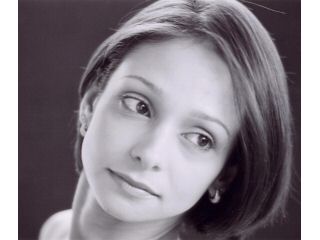
Roberta Marquez
Finally, the long awaited Royal Ballet has come to Singapore to perform the legendary Swan Lake. Many people has said that watching a live ballet is a totally different experience from watching it on screen, now, I've finally be able to understand fully what do they mean by that, especially when the ballet troupe I see is Royal Ballet. The ballerina was changed from Alina Cojocaru to Roberta Marquez in the last minute, due to some unknown reason. Was pretty disappointed in the first place, but nonetheless, it was still an excellent performance.
The tragic storyline was wonderfully brought out by the cast tonight. As the storyline unfolds, it was heart wrenching yet at the same time, emotionally fulfilling, for behind the tragic drama, there's so much beauty. The majesty and magnificence of the ballet shine through to the audience through the sheer artistry and brilliance of the dancers.
Roberta Marquez was certainly amazing tonight. She certainly danced the character of Odette-Odile very well, having a distinction between the two characters. In the duet between Prince Sigfried and Odette in Act II, the mood was that of an intense, passionate love, while in that Pas de Deux in Act III, Marquez managed to bring out the seductive side of Odile, yet retaining her own unique style. I lost count of the number of fouettes Marquez made tonight, but her fouettes certainly earned the thunderous applause of the audience here. Now, this is one rare occasion when the musicians wouldn't mind the audience clappping while the music is being played halfway.
The Royal Ballet is being accompanied by the Shanghai Phiharmonic Orchestra in this trip here. Now, I would like to make this clear, my applause tonight was solely for the wonderful dancers and not for the orchestra. If not for the fact that Tchaikovsky's music is still beautiful when played not so well, I would have just be suffering in there. The brass and woodwind sections were overpowering, drowning out the string section, sounding rough and barbaric at times. Talking about the string section, they sounded pretty dead. I did expected much more from this orchestra which they brought in, but they ought to learn that to make a music sound grand, they do not have to blast all their breath into the instruments. Moreover, Tchaikovsky's music is supposed to be emotional music. So I have absolutely no idea why they're trying so hard to achieve volume over expression. Oh well, I have to admire the dancers for being able to dance so well despite the orchestra playing below expectations.
All in all, it was an absolutely wonderful and emotional night of ballet dancing. =)
Thursday, June 23, 2005
A Date With Moscow Virtuosi
It was this concert tonight which brought me back to life again after being dead for the past few weeks. A few months back, the posters and advertisements in the newspaper and websites for this chamber orchestra, Moscow Virtuosi, didn't catch my attention at all. Yes, I do love orchestral music, yet I merely treated it as another similar performance like that of our Singapore Symphony Orchestra (SSO). It was until last week when I was attracted to one of the pieces (Concerto for Two Violins, Strings and Continuo in D minor, BWV 1043, by Bach) they were going to play tonight that I went to get the ticket for their performance. Little did I know that that particular concerto was the one which least impressed me tonight...
It was the very first time that live orchestra music touched me in such an intimate way. I'm sure the rest of the audience experienced it too, from the responses they gave. It did took them a while to warm up, but in the later pieces, this orchestra sure proved themselves to be one of the finest chamber orchestra in the world. For the first piece, they played Bach's concerto. The solo violinists displayed their sheer virtuosity in the two outer movements, alternating the fugal theme with the orchestra with unbelievable perfection, without sounding too rushed like that in Hilary Hahn's recording. The slow movement was wonderfully expressive, though I'd prefer Hahn's rendition of it. At times when the soloist, Vladimir Spivakov (also the founding member and chief conductor of this orchestra), wasn't playing, he was deeply immersed in the music, dancing subtly or raising his head and staring at the magnificent architecture of the Esplanade Concert Hall.
The last piece excluding the four short encoures they played tonight was the peak of the night. It was the Symphony No. 45 in F# minor, "Farewell" by Franz Joseph Haydn. This orchestral piece was written by Haydn to request subtly for a rest for his musicians, who worked in the summer home of the prince. The orchestra consists of only two oboes, two Frech horns and strings, the only piece where the brass and woodwind instruments came in. I love the first three movements, but it was the fourth movement, Finale, which transformed the night. As the piece was being played, members of the orchestra members left their seats one by one to go backstage, together with the lights being dimmed. While all this stage business was going on, the remaining musicians carried on playing that wonderful adagio with perfect calmness. After about three quarters of the musicians have left, Vladimir Spivakov, the conductor in this piece, picked up his Antonio Stradivarius violin and played the first violin part, until the piece ended with one first violin player and Vladimir Spivakov himself. Just before the last notes, the whole hall just blacked out. That's such a wonderful effect, with the spirit of the piece being brought out so wonderfully. From that piece to the four encoures, the orchestra was given a standing ovation and delightful cheers from members of the audience.
This is the first orchestral concert I watched whereby the orchestra truly deserved a standing ovation. This is a perfect example of the conductor was totally transparent, allowing the spirit of the composer at the time of composing this piece flow to the audience without adding any extra ingredients. It was just as if I was at the night when Haydn conducted the orchestra. Yes, generous is the word. In studying music, he had took so much of music into him and tonight, he has given all that he could give to the audience through his music, unlike some other performers who just treat performing like just another performance. Generous musicians are what the world needs. I've been so desensitised by the army life in the past few months that I have lost the feeling of being alive. Thank God, for putting the burden on me to go for this concert. I've learnt a lot and shall put in what I've learnt into my music.
Playing from the heart...
It was the very first time that live orchestra music touched me in such an intimate way. I'm sure the rest of the audience experienced it too, from the responses they gave. It did took them a while to warm up, but in the later pieces, this orchestra sure proved themselves to be one of the finest chamber orchestra in the world. For the first piece, they played Bach's concerto. The solo violinists displayed their sheer virtuosity in the two outer movements, alternating the fugal theme with the orchestra with unbelievable perfection, without sounding too rushed like that in Hilary Hahn's recording. The slow movement was wonderfully expressive, though I'd prefer Hahn's rendition of it. At times when the soloist, Vladimir Spivakov (also the founding member and chief conductor of this orchestra), wasn't playing, he was deeply immersed in the music, dancing subtly or raising his head and staring at the magnificent architecture of the Esplanade Concert Hall.
The last piece excluding the four short encoures they played tonight was the peak of the night. It was the Symphony No. 45 in F# minor, "Farewell" by Franz Joseph Haydn. This orchestral piece was written by Haydn to request subtly for a rest for his musicians, who worked in the summer home of the prince. The orchestra consists of only two oboes, two Frech horns and strings, the only piece where the brass and woodwind instruments came in. I love the first three movements, but it was the fourth movement, Finale, which transformed the night. As the piece was being played, members of the orchestra members left their seats one by one to go backstage, together with the lights being dimmed. While all this stage business was going on, the remaining musicians carried on playing that wonderful adagio with perfect calmness. After about three quarters of the musicians have left, Vladimir Spivakov, the conductor in this piece, picked up his Antonio Stradivarius violin and played the first violin part, until the piece ended with one first violin player and Vladimir Spivakov himself. Just before the last notes, the whole hall just blacked out. That's such a wonderful effect, with the spirit of the piece being brought out so wonderfully. From that piece to the four encoures, the orchestra was given a standing ovation and delightful cheers from members of the audience.
This is the first orchestral concert I watched whereby the orchestra truly deserved a standing ovation. This is a perfect example of the conductor was totally transparent, allowing the spirit of the composer at the time of composing this piece flow to the audience without adding any extra ingredients. It was just as if I was at the night when Haydn conducted the orchestra. Yes, generous is the word. In studying music, he had took so much of music into him and tonight, he has given all that he could give to the audience through his music, unlike some other performers who just treat performing like just another performance. Generous musicians are what the world needs. I've been so desensitised by the army life in the past few months that I have lost the feeling of being alive. Thank God, for putting the burden on me to go for this concert. I've learnt a lot and shall put in what I've learnt into my music.
Playing from the heart...
Tuesday, June 21, 2005
The Bach Concerto You Played That Evening
I'll never forget the image of you playing Bach's Concerto for Two Violins, Strings and Continuo in D minor that evening. That slow, lyrical 2nd movement was like a sharp arrow which pierced straight into my heart, bringing about a wealth of passionate emotions. Despite the annoying murmurings of the unappreciative audience in that casual recital, you have shown yourself to be calm and deeply absorbed in caressing the best tone out of your violin, with no hint of any urgency in your music. Through the heartwrenching and sweet 2nd movement, you seem to be telling me to remember you whenever I hear that piece...
Sunday, June 19, 2005
Beauty of the Fugue
When one mentions the fugue, J.S Bach comes into mind. He's the supreme master of the fugue, a musical form with a texture containing a number of individual voices (a subject and several countersubjects), usually more than two. Fugues usually start with just a short melody, known as the subject, followed by the imitation of several voices in close succession. Yeap, think of that subject jumping, running, skipping and dancing etc. And while the countersubject doing a few stunts here and there, there's the pure subject present at the same time. The greatest monuments of Bach are the Well-Tempered Clavier and Art of the Fugue. So well, that's the fugue in brief.
Just started practising on the Fugue (BWV 1000) by Bach. That's one of the very few fugues I can choose from as the guitar doesn't have the privilege or capability of playing the greatest fugues by Bach. It's still a very lovely piece nonetheless. It's not as easy as it really seems to be. For the first page, most of the fingerings are in the first position, yet it took me hours just to make those notes seem natural at a the slowest speed on the metronome. The fingerings for the left hand aren't hard at all, but trying to control the subject and countersubjects is really challenging. And the very fact that the fingerings on the left hand are easy makes that first page hard to memorise. Problem is that I still can't connect to this piece as well as Prelude, Fugue and Allegro (BWV 998). Due to the time constraints, I guess I'll have to leave the latter to next year. Oh well. But this is the first major piece for the lute by Bach that I'm playing and it's very, very addictive, especially when I think of my guitar being able to sing out this charming piece by my favourite composer at the end of the day. =)
Just started practising on the Fugue (BWV 1000) by Bach. That's one of the very few fugues I can choose from as the guitar doesn't have the privilege or capability of playing the greatest fugues by Bach. It's still a very lovely piece nonetheless. It's not as easy as it really seems to be. For the first page, most of the fingerings are in the first position, yet it took me hours just to make those notes seem natural at a the slowest speed on the metronome. The fingerings for the left hand aren't hard at all, but trying to control the subject and countersubjects is really challenging. And the very fact that the fingerings on the left hand are easy makes that first page hard to memorise. Problem is that I still can't connect to this piece as well as Prelude, Fugue and Allegro (BWV 998). Due to the time constraints, I guess I'll have to leave the latter to next year. Oh well. But this is the first major piece for the lute by Bach that I'm playing and it's very, very addictive, especially when I think of my guitar being able to sing out this charming piece by my favourite composer at the end of the day. =)
Thursday, June 16, 2005
Soul of the Milonga
I didn't realise that the milonga was actually some sort of rhythm or musical form until I practised on the piece, Milonga del Angel, by Astor Piazzolla - the famous composer best known for revamping the face of traditional tango music by moving the tango music away from the dance floors, adding cool jazzy elements and rejecting its tendencies towards sentimentality and bouts of morbid self-pity. He almost gave up his tango and bandoneon for traditional classical music due to critcism that his tango music was too complicated to be played by musicians but I'm really glad that he didn't. =) His music, when in the hands of a master, can make one shed tears. The tango is to Argentina what the flamenco is to Spain. Alright, enough of the tango, I'm supposed to comment on the milonga.
Apparently, the milonga and tango are different genres within the Argentine music, though they sound pretty much the same to me, most probably due to my shameful ignorance of this branch of music. It is suspected that the milonga had its roots in the Spanish culture, but well, when one talks about the milonga, Argentina comes into mind instead of Spain. Piazzolla composed two forms of milonga, the first fast and exciting, that takes on the rhythm of the dance of the early century and the second is the slow tango milonga, like the piece, Milonga del Angel, which I'm learning right now. The beauty of Piazzolla's milonga, like his tangos, is the fact that his works are not just a mere simple evolution of the the traditional form, but make use of the typical accentuation of the milonga but mixed with some of his musical style, rebuilt with his own harmonic and melodic procedures that make them fully piazzolleano. And these works still retain the unique atmosphere of the milonga. Beautiful, isn't it?
I was quite surprised to find out that milongas were originally played on the guitar. And today, we've this slow milonga which was transcribed to the guitar and it fits so beautifully into the guitar repertoire. It was in the later section where the milonga rhythm became more distinctive, with the beat 1 2 3 1 2 3 1 2. The last few bars before the repeat were pretty much the killer in this piece due to the shifts and non-so-natural fingerings involved. That really makes keeping the rhythm much harder. Nonetheless, I'll strive hard to make sure that the piece sounds natural before this Sunday so that I can start on the other pieces.
Apparently, the milonga and tango are different genres within the Argentine music, though they sound pretty much the same to me, most probably due to my shameful ignorance of this branch of music. It is suspected that the milonga had its roots in the Spanish culture, but well, when one talks about the milonga, Argentina comes into mind instead of Spain. Piazzolla composed two forms of milonga, the first fast and exciting, that takes on the rhythm of the dance of the early century and the second is the slow tango milonga, like the piece, Milonga del Angel, which I'm learning right now. The beauty of Piazzolla's milonga, like his tangos, is the fact that his works are not just a mere simple evolution of the the traditional form, but make use of the typical accentuation of the milonga but mixed with some of his musical style, rebuilt with his own harmonic and melodic procedures that make them fully piazzolleano. And these works still retain the unique atmosphere of the milonga. Beautiful, isn't it?
I was quite surprised to find out that milongas were originally played on the guitar. And today, we've this slow milonga which was transcribed to the guitar and it fits so beautifully into the guitar repertoire. It was in the later section where the milonga rhythm became more distinctive, with the beat 1 2 3 1 2 3 1 2. The last few bars before the repeat were pretty much the killer in this piece due to the shifts and non-so-natural fingerings involved. That really makes keeping the rhythm much harder. Nonetheless, I'll strive hard to make sure that the piece sounds natural before this Sunday so that I can start on the other pieces.
Tuesday, June 14, 2005
Apprehension
Maybe this is too high a jump for me after all. Getting a little apprehensive if I'll be able to perfect those four pieces before the competition. Coupled with the fact that I'm in the army and my practice time is limited, tripled with the fact that my instrument is inferior to many of the other competitors. Don't get me wrong, I don't detest my instrument, she's still my beloved lover right now. But it really takes much more effort to get a pure sound out of her as compared to when I play a more expensive instrument. Well, the only way to get a better guitar is through this competition.
Oh well, guess it's wrong to go for the competition to get a better guitar anyway. I'm a musician and my only quest is to achieve the most perfect sound and therefore, play the most perfect music which carries the softest, most tender message that penetrates the listerner's heart like an arrow. Can't allow such a pure passion to be tainted by materialism. Never mind if I don't get through, I'll just do what that is possible and enjoy my practices instead of being burdened by deadlines, which undoubtedly takes out the fun of practising music...
Oh well, guess it's wrong to go for the competition to get a better guitar anyway. I'm a musician and my only quest is to achieve the most perfect sound and therefore, play the most perfect music which carries the softest, most tender message that penetrates the listerner's heart like an arrow. Can't allow such a pure passion to be tainted by materialism. Never mind if I don't get through, I'll just do what that is possible and enjoy my practices instead of being burdened by deadlines, which undoubtedly takes out the fun of practising music...
Thursday, June 09, 2005
Perfection and Expression
Is it really true that paying too much attention trying to be perfect will decrease one's expressiveness? I think I'm going to focus on the expression for the short performance this Saturday without caring about being too perfect. For the past one year, all my performances have been unsatisfactory and I haven't been able to pinpoint what's wrong. I doubt it's due to the lack of practice for ample time has been given to me to practise. Everytime I step onto the stage, my mind seems to be overwhelmed by the need to be perfect. Now that I've thought through about this problem quite intensively these 2 weeks, I realise that music isn't about perfection. It's not a way to express one's emotion. It's emotion itself. And I'd rather express this emotion well instead of merely perfecting the notes. Therefore, this time, I've decided to change my mindset totally. Forget about perfection, I'm sure I know the notes anyway. I'll focus all my mind on expressing the music well.
Decided to change the pieces to Capricho Arabe by Francisco Tarrega and Prelude from Bach's Cello Suite No. 1. Decided to treat this small performance a little more seriously, that's why I scrapped the new pieces which I've just practised two weeks ago. =)
Well now, hope that the performance goes well on Saturday and I'll get the elusive satisfaction which has been missing...
Decided to change the pieces to Capricho Arabe by Francisco Tarrega and Prelude from Bach's Cello Suite No. 1. Decided to treat this small performance a little more seriously, that's why I scrapped the new pieces which I've just practised two weeks ago. =)
Well now, hope that the performance goes well on Saturday and I'll get the elusive satisfaction which has been missing...
Unknown Vocal Work by J. S. Bach Discovered

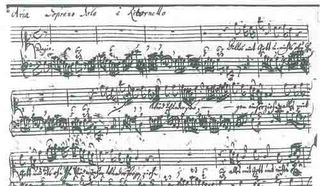
Unknown original handwritten score of our beloved J.S. Bach
Taken from http://www.bach-leipzig.de/Woo!! Another work by my favourite composer is found! Praise the Lord! Have been listening to St Matthew Passion by Bach recently. This new vocal work may not be as large scale or major a work as the passion, but I can't wait for the recording to be released!! Sir John plans to record this piece before Christmas and perform it at London's Cadogan Hall on the 18th December 05. The last work by Bach which was discovered was in 1975 - extra canons for the piano in the composer's own handwriting. And as mentioned above, the last vocal work by Bach was discovered in 1935. And now, another work by the legendary composer has surfaced in 2005. To think that it was hidden in a elusive old shoebox for three centuries, concealed with some poems and verses. Apparently, from what Professor Wolff, the world's leading expert on J.S Bach, has mentioned, we don't know much about Bach from this period for very little has survived. Never mind, hope that we shall be able to see more of Bach's works surfacing in the near future. =)
A completely unknown composition by Johann Sebastian Bach was discovered at the Anna Amalia Library in Weimar, Germany by a researcher from the Leipzig Bach Archive. The discovery was made by Michael Maul in the course of a systematic survey of all central German church, communal, and state archival collections, an ongoing research project begun in 2002 and supported by the Packard Humanities Institute and the William H. Scheide Fund.
The score in Bach’s own hand dates from October 1713 and represents a setting of a strophic aria with ritornello for soprano, strings, and basso continuo composed on the occasion of the 52nd birthday of duke Wilhelm Ernst of Saxe-Weimar, whom Bach then served as court organist. The twelve-stanza sacred poem with the text incipit "Alles mit Gott und nichts ohn’ ihn" (Everything with God and nothing without him), the duke’s motto, was written by the theologian Johann Anton Mylius.
There has been no previous record of, or reference to, this composition. Moreover, in the seventy years since the 1935 discovery of the single-movement cantata fragment “Bekennen will ich seinen Namen” (BWV 200) no unknown authentic vocal work by Bach has come to light.
“It is no major composition but an occasional work in the form of an exquisite and highly refined strophic aria, Bach’s only contribution to a musical genre popular in late 17th-century Germany,” said Professor Christoph Wolff of Harvard University, chair of the Board of the Bach Archive, initiator, and supervisor of the current research project. “I am extremly proud of Michael who is a most resourceful researcher,” he added. “In less than three years he uncovered an unparalleled number of new archival Bach documents, but this is the first time he presented a musical discovery. The overall research project is far from being over and I am quite sure that sooner or later Michael Maul will make news again.”
A facsimile and performing edition of the newly discovered piece will be published in the fall of 2005 by Bärenreiter-Verlag of Kassel, Germany. The first recording will be prepared by Sir John Eliot Gardiner, this year’s winner of the Bach Medal of the city of Leipzig.
Wednesday, June 08, 2005
Ballet Music of Tchaikovsky
To think I've missed out mentioning the ballet music in the previous entry on the Royal Ballet. The music of our beloved Swan Lake is composed by the greatest Russian composer, Pyotr Ilich Tchaikovsky. A master whom I believe is on par with Beethovan and Mozart. To think that he's wasn't ranked inside the Mighty Five - the school of great nationalist composers of his day: Modest Mussogsky, Aleksandr Borodin, Mily Balakirev, Cesar Cui and Nikolay Rimsky-Korsakov. But now, time has shown that Tchaikovsky's music has surpassed the rest of the others. He's the serious composer who, at the same time, brought to ballet music, the qualities it so badly needed at the time. Ballet composers are pretty much like seamstresses cutting material - made to fit. Listen to the music of Ludwig Minkus or Riccardo Drigo and one can easily understand how deary it can be. Tchaikovsky singlehandedly changed that scne with his daring exploitations of the orchestra and great musical plans.
The first Tchaikovsky's music I heard was his Symphony No. 5 and that certainly caught my attention. From a dark first movement to a grand, triumphant march in the final movement. Little did I realise that his ballet music would be so much better...
He led a tormented life due to his strange sexual preferences. And his biography suggests an emotional life of great depth and sensitivity. Listen to the Waltz of the Flowers in the ballet, The Nutcracker. It's such a decorative and lovely waltz, and listen carefully to the lower strings in that contrasting section, don't you hear them seem to weep in anguish? A flip side to the music. Despite his strange sexual preferences, he exercises a careful control in his music, freely acknowledging a feminine element together with a powerfully masculine one that is virile and exact. From his music, there is no element of hysteria which would be expected of someone with a life like him.
Out of his 3 currently most famous ballet music, only The Sleeping Beauty, was well received during his days. Both Swan Lake and The Nutcracker, ironically the two most famous ballet music today, were flops in his time, due to reasons like having overaged ballerinas, substandard choreographers and an orchestra that simply couldn't handle such a high level score. Now, these music are a must-have in the standard repertoire of any good orchestra. What a pity that people during his time have been robbed of such good ballet and music...
I'm really blessed to be able to get the tickets for the ballet. The Shanghai Philharmonic Orchestra will be performing with Royal Ballet here. Hope that they'll be able to co-ordinate and bring out the essence of Tchaikovsky's music...
The first Tchaikovsky's music I heard was his Symphony No. 5 and that certainly caught my attention. From a dark first movement to a grand, triumphant march in the final movement. Little did I realise that his ballet music would be so much better...
He led a tormented life due to his strange sexual preferences. And his biography suggests an emotional life of great depth and sensitivity. Listen to the Waltz of the Flowers in the ballet, The Nutcracker. It's such a decorative and lovely waltz, and listen carefully to the lower strings in that contrasting section, don't you hear them seem to weep in anguish? A flip side to the music. Despite his strange sexual preferences, he exercises a careful control in his music, freely acknowledging a feminine element together with a powerfully masculine one that is virile and exact. From his music, there is no element of hysteria which would be expected of someone with a life like him.
Out of his 3 currently most famous ballet music, only The Sleeping Beauty, was well received during his days. Both Swan Lake and The Nutcracker, ironically the two most famous ballet music today, were flops in his time, due to reasons like having overaged ballerinas, substandard choreographers and an orchestra that simply couldn't handle such a high level score. Now, these music are a must-have in the standard repertoire of any good orchestra. What a pity that people during his time have been robbed of such good ballet and music...
I'm really blessed to be able to get the tickets for the ballet. The Shanghai Philharmonic Orchestra will be performing with Royal Ballet here. Hope that they'll be able to co-ordinate and bring out the essence of Tchaikovsky's music...
Tuesday, June 07, 2005
Royal Ballet in Singapore
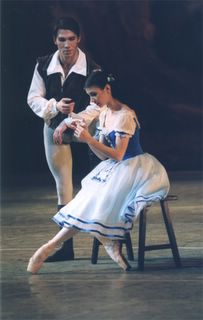
Alina Cojocaru
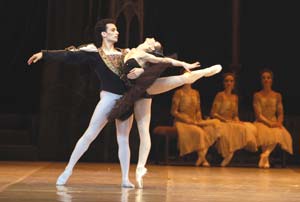
Roberta Marquez

Marianela Nuñez
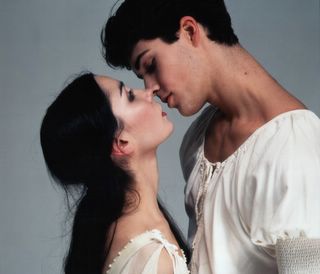
Tamara Rojo
Above are the four ballerinas from Royal Ballet who will be coming down to perform Swan Lake in Singapore from the 24th June 2005 to 28th June 2005.
Royal Ballet's coming down to Singapore to perform Swan Lake in two week's time. Till now, I can only get the circle seat for Alina Cojocaru's show on 24th June. Arg, I could have paid up to S$200 for the stall seats for all four shows, but to think that the tickets have been almost sold out half a year before the concert. I'm so disappointed!! The most famous ballet troupe, performing the most famous ballet in history in the traditional choreography (in my opinion is the best) by Lev Ivanov. Just thinking of this just makes me feel like stabbing myself for not booking the tickets early. But at least I got the tickets for the performance with Alina Cojocaru as the principal ballerina. Watched the DVD of her performing The Nutcracker and that blew me off. Her looks are average and build is small, yet when she danced her role, the stage was just set ablaze and her presence caught the immediate attention of the audience. To think that months after watching her on DVD, this lovely girl is scheduled to come down to Singapore to perform the ballet Swan Lake. Phew, was so worried that I wouldn't be able to go for this show. Thank God... =)
Looking forward to her dancing the roles of Odile/Odette. Will she be able to bring out the roles well? Odile is the Swan Princess and the very reason why this ballet remains one of the most famous ones in history is that even though the plot seems so fictional, everyone could connect with the role of Odile. Even a ballet with a more practical plot like Giselle or Coppelia doesn't even come close. The heroines of these other classics all have some relation to the real world, being peasant girls or princesses. Strange things happen to them, yet they live within determined conventions. However, the heroine of Swan Lake has another story. She is a princess of the night; she is all magic, a creature of the imagination. Being under the spell of the mysterious sorcerer, Von Rotbart, she is immediately pathetic, a creature whose initial fear and consuming love interest us immediately. The dignity and courage and authority she possesses as the Queen of the Swans become, in the ballet, the dignity of the woman in love. Even in this magical world she inhibits, she is never, at any point, unreal or absurb to us, because we see that love doesn't shatter her dignity; rather, it ennobles us her beauty and explains her universal appeal. So now, will she be able to succeed in this ballet, keeping in mind that it's the legendary choreography of Lev Ivanov and Marius Petipa?
Sunday, June 05, 2005
Atonality
Atonality refers to music without a tonal centre, that is, without a home key. The method of composition for such music, the twelve tone system, is founded by Arnold Schoenberg. Ever since the time that this system was developed, it remains controversial. In this age, I thought we ought to have accepted this system and start to appreciate the beauty and limitations of the twelve tone system. Looks like this is taking more time than needed to blend into the music scene.
This system has polarised all responses to it. You either love it or hate it. I have listened to a selected few pieces of atonal music, and out of a scale of -10 to 10, with 0 being neutral, I'd rate such music around 4. But throughout history, it seems that this Second Viennese School wasn't given a very warm welcome by the music scene. Audiences had shouted abuse and fights had broken out in the middle of such atonal music concerts. Is atonal music truly that repulsive to our ears? Dissonances have been present ever since tonality came into the world, yet why do people detest music that contain only dissonances? We've accepted modernism in other art forms, like Jackson Pollock's drip paintings, James Joyce's Ulysses and others, then why not modernism in music? That's what abstract expressionism in art is all about. Maybe to those people who denounce this system of music, art is defined as anything that seems good to them and anything that doesn't suit their taste is thrown into the trash section. Isn't that myopic and self-centered? Is that what appreciating the arts is all about?
Yes, I agree that it isn't music which you would listen for leisure, it's very heavy music which makes you think. I'm not sure about the others, but I've fallen asleep in some concerts of tonal music because they're too boring. (Do not mistake that for bad music. The music can be touching yet boring at the same time.) But in concerts where atonal music is being played, it's as if my senses have been awakened and it sets my whole mind working, searching for the intentions behind the composer's mind in composing such music. And from my experience, it tires the listener mentally very fast.
But to think that some have connected atonality with nihilism (belief in nothing). That's a scary thought. I went to check up on nihilism and one of the best quotes in art for nihilism would be found in Shakespeare's Macbeth:
Alright, back to the topic, abstract expressionism doesn't mean having no meaning. Atonal music isn't irrational, I believe that atonal musicians are still in the right frame of mind to understand what they're writing, yet they're using this twelve-tone system to express their thoughts and feelings. Of course, such thoughts and feelings wouldn't be easily felt by the average listener and it takes a greater set of ability to understand and appreciate such beauty of the music.
A tip from me. When listening to an atonal piece of music, do not have any expectations in mind. Keep an open mind and take what that is coming. Don't ask me about interpretation, I have absolutely no idea how does one go about playing atonal music and Schoenberg has commented that his music wasn't supposed to sound so modern, just that they've been badly played...
This system has polarised all responses to it. You either love it or hate it. I have listened to a selected few pieces of atonal music, and out of a scale of -10 to 10, with 0 being neutral, I'd rate such music around 4. But throughout history, it seems that this Second Viennese School wasn't given a very warm welcome by the music scene. Audiences had shouted abuse and fights had broken out in the middle of such atonal music concerts. Is atonal music truly that repulsive to our ears? Dissonances have been present ever since tonality came into the world, yet why do people detest music that contain only dissonances? We've accepted modernism in other art forms, like Jackson Pollock's drip paintings, James Joyce's Ulysses and others, then why not modernism in music? That's what abstract expressionism in art is all about. Maybe to those people who denounce this system of music, art is defined as anything that seems good to them and anything that doesn't suit their taste is thrown into the trash section. Isn't that myopic and self-centered? Is that what appreciating the arts is all about?
Yes, I agree that it isn't music which you would listen for leisure, it's very heavy music which makes you think. I'm not sure about the others, but I've fallen asleep in some concerts of tonal music because they're too boring. (Do not mistake that for bad music. The music can be touching yet boring at the same time.) But in concerts where atonal music is being played, it's as if my senses have been awakened and it sets my whole mind working, searching for the intentions behind the composer's mind in composing such music. And from my experience, it tires the listener mentally very fast.
But to think that some have connected atonality with nihilism (belief in nothing). That's a scary thought. I went to check up on nihilism and one of the best quotes in art for nihilism would be found in Shakespeare's Macbeth:
-
- Out, out, brief candle!
- Life's but a walking shadow, a poor player
- That struts and frets his hour upon the stage
- And then is heard no more; it is a tale
- Told by an idiot, full of sound and fury,
- Signifying nothing. (Act 5, Scene 5)
Alright, back to the topic, abstract expressionism doesn't mean having no meaning. Atonal music isn't irrational, I believe that atonal musicians are still in the right frame of mind to understand what they're writing, yet they're using this twelve-tone system to express their thoughts and feelings. Of course, such thoughts and feelings wouldn't be easily felt by the average listener and it takes a greater set of ability to understand and appreciate such beauty of the music.
A tip from me. When listening to an atonal piece of music, do not have any expectations in mind. Keep an open mind and take what that is coming. Don't ask me about interpretation, I have absolutely no idea how does one go about playing atonal music and Schoenberg has commented that his music wasn't supposed to sound so modern, just that they've been badly played...
Flamenco
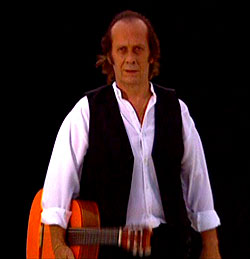
Paco de Lucia is perhaps the most universal of flamenco performers.
Flamenco is a form of art which is exclusive to the Spanish culture, strongly influenced by the Gitanos or gypsies in Spain, but has its deeper roots in Moorish musical traditions. It exists in 3 forms, namely the Cante (song), Baile (dance) and Guitarra (guitar playing). Much of the development of flamenco music has been lost due to the tumultuous times involved. The Jewish gypsies were all persecuted by the Spanish Inquisition at the various points in time. It was in such unbearable times that give rise to formation of flamenco music. You don't exactly listen to flamenco music like you listen to traditional classical music. Flamenco is expression of the hard life experienced by the gypsies in Andalusia, reflecting the spirit of dejection, desperation and suffering, yet at the same time, there're traces of pride and hope in the music.
No, it isn't sung or danced or played to impress anyone, it's living emotion, a living tragedy. Purest form of the darkest emotion. Which is probably why it is said that no one outside Spain will be able to fully connect with the music or play that music well. It is not an art form that just anyone can practise, but it requires a deep personal expression of tragedy, an intense feeling of happiness, very emotional experiences that come straight from the heart and soul.
When Paco Pena came to perform a concert for the Guitar Festival '04 in Singapore last year, there were several pieces which blew our minds off. He played his flamenco guitar to the extent that I could feel my adrenalin surging through my veins. It was as if there something inside me which needed release desperately. And I'm sure that was felt by every single one in the audience too. It was pretty much like what happens in a rock concert. But that feeling wasn't caused by the beatings of any drums or screaming of the vocalists like those from a rock concert. People call it the duende - a mysterious force that everyone feels and yet no one can explain. It's probably in the intricate yet elusive rhythm characteristic of flamenco. It doesn't affect just your heart and your mind, it sweeps through your whole body and leaves you thinking if you're still alive...
Classical composers have been influenced by flamenco music, especially Spanish composers. Composers like Manuel de Falla, Joaquin Rodrigo, Isaac Albeniz etc. I haven't been able to play much of their music yet but I'll be practising hard in the meantime to improve my techniques in order to immerse myself as much as possible in such a beautiful culture.
Saturday, June 04, 2005
Visiting Alhambra
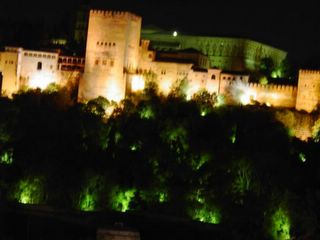
Posting several pictures of one of my favourite monuments on Earth. If I could visit this magnificent palace, I wouldn't mind sleeping forever...

"The Sabikah is Granada's crown, and the Alhambra is the ruby at the top of the crown."
-Ibn Zamrak
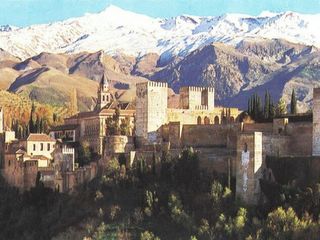
Some background on this austere fortress. It is situated in the province of Granada, in Andalusia, which is in Spain. Standing out prominently against the grand background of Sierra Nevadas, this monument has a rich legend dating back to the time of the Moors' final defeat. What we see now is one of the many vestiges left behind by the different conquerors in history, namely the Arabs and the Christians.
Alright, that's all I have right now, will talk about some of the music inspired by this grand monument and Spain some other time.
Subscribe to:
Comments (Atom)
